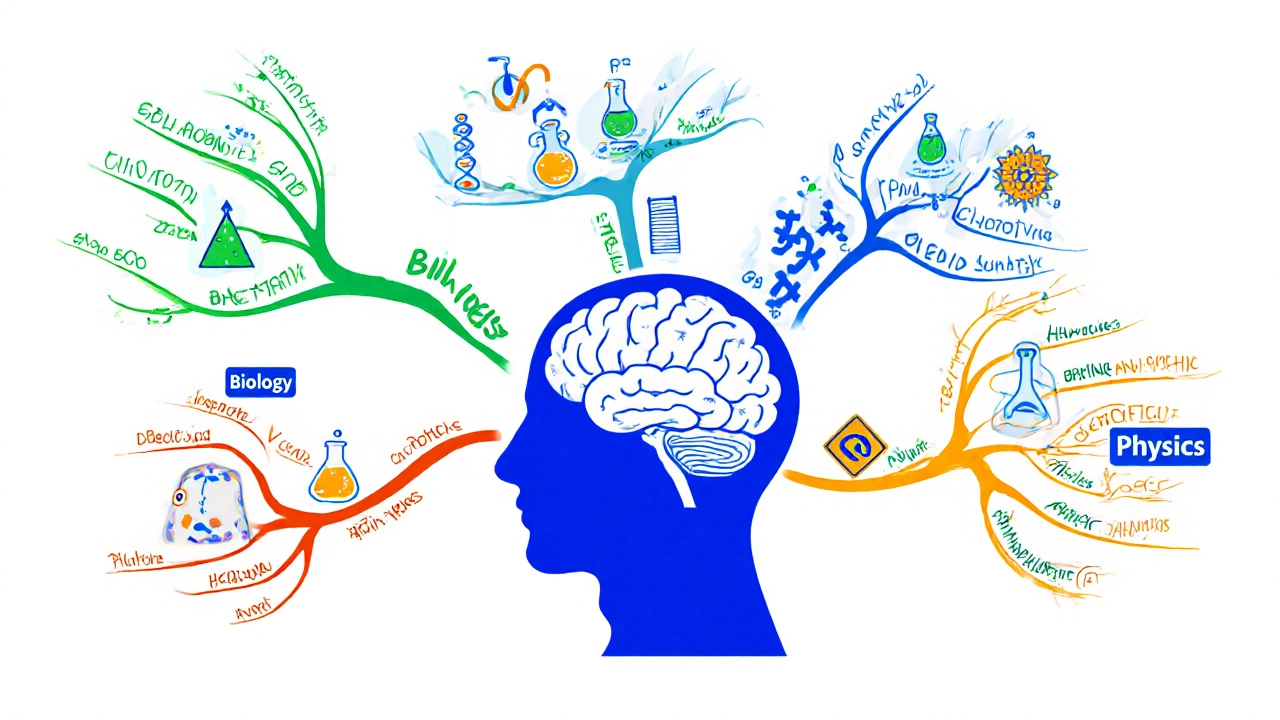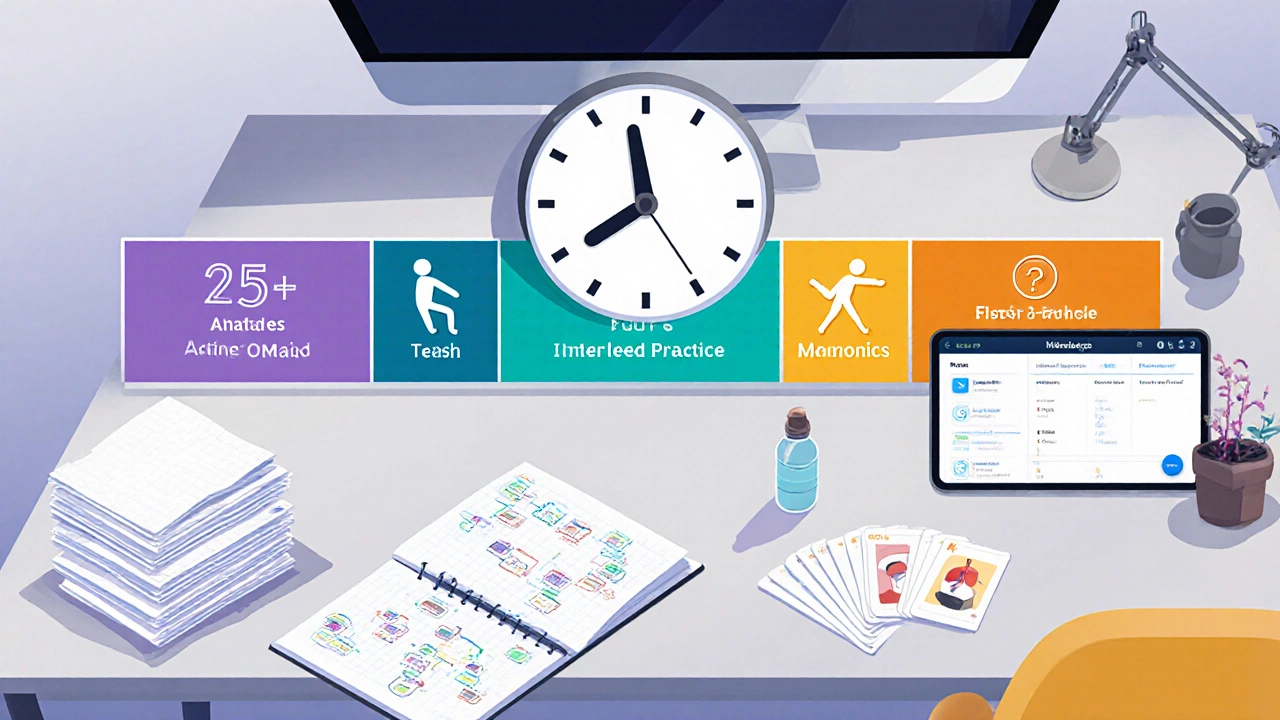NEET Study Scheduler
How to Use This Tool
Enter your daily study time and target subjects to generate an optimized schedule based on NEET exam weightage and cognitive science principles.
Key Features:
- Optimizes study blocks based on NEET subject weightage (Biology 45%, Chemistry 30%, Physics 25%)
- Calculates ideal Pomodoro sessions (25 min study + 5 min break)
- Provides time allocation recommendations
- Shows how to balance high-yield topics
Your Optimized NEET Study Plan
Based on your input of minutes daily study time and selected subjects
Pomodoro Blocks
25 min study + 5 min breakSubject Allocation
Study Strategy Recommendations
Active Recall Strategy: For each Pomodoro session, close your notes and try to recall key concepts before checking.
Spaced Repetition Tip: Schedule your flashcard reviews right before you're about to forget the information.
High-Yield Focus: Spend 70% of your time on the 200 high-yield topics that cover 65% of exam questions.
Key Takeaways
- Combine active recall with spaced repetition for max retention.
- Focus on high‑yield topics first; they make up 60‑70% of the exam.
- Use visual mnemonics and mind‑maps to turn dense facts into easy pictures.
- Practice with past papers every 3‑4 days to convert memory into exam skill.
- Limit study bursts to 25‑30 minutes and schedule short breaks to avoid fatigue.
When you hear NEET is the National Eligibility cum Entrance Test, India’s premier exam for admission into MBBS and BDS courses, the first thought is often “how can I cram all this info quickly?” The pressure to remember hundreds of pages of biology, chemistry, and physics can feel overwhelming. Below is a step‑by‑step playbook that tackles the problem head‑on, using science‑backed memory hacks and a realistic schedule that fits a busy student’s life.
Understanding the NEET Syllabus and High‑Yield Zones
Before you load your brain with tricks, you need a clear map of what you’re actually memorizing. The syllabus is divided into three subjects, each with its own weightage:
- Biology - 45% (Botany 22%, Zoology 23%)
- Chemistry - 30% (Physical 17%, Organic 13%)
- Physics - 25%
Data from the last five years of AIIMS a top medical college that also conducts a similar entrance exam shows that about 65% of the questions come from a core set of 200 high‑yield topics. Target those first and you’ll cover most of the exam without drowning in details.
Core Memory Techniques That Work for NEET
All the techniques listed below are proven by cognitive science, but only a few fit the fast‑track mindset. Here’s the shortlist:
1. Active Recall
Instead of passively rereading notes, close the book and ask yourself what the key point was. For example, cover a diagram of the heart and try to name each valve before checking. This forces the brain to retrieve information, strengthening the neural pathways. A study by the Indian Institute of Technology (IIT) in 2023 found that students who used active recall scored 12% higher on mock NEET tests.
2. Spaced Repetition
Memory fades quickly, but if you revisit a fact just as you’re about to forget it, the brain refreshes the trace. Use a tool like Anki a flash‑card app that automatically schedules reviews based on your performance. Set a daily limit of 30‑40 cards; each card will appear again after 1 day, 3 days, 7 days, 14 days, and so on.
3. Mnemonics & Visual Mapping
Convert abstract facts into vivid images. "My Very Educated Mother Just Served Us Noodles" becomes a shortcut for planetary order; for NEET replace it with "Blood Flow: Aorta, Vena Cava, Pulmonary Artery, Pulmonary Vein" and picture a highway with traffic signs. Mind‑maps work similarly-draw a central node (e.g., "Cell Cycle") and branch out with colors and icons.
4. Interleaved Practice
Instead of spending 2hours on only physics, mix short blocks of biology and chemistry. This forces the brain to constantly switch contexts, which improves retention and mimics the real exam’s random question order.

Comparison of Fast‑Track Memorization Techniques
| Technique | How it works | Best for | Time investment per day |
|---|---|---|---|
| Active Recall | Self‑questioning after reading | All subjects | 15‑20min |
| Spaced Repetition | Algorithmic review intervals | Fact‑heavy topics (Biology, Organic Chemistry) | 30‑40min (flashcards) |
| Mnemonics & Visual Maps | Images or stories linked to concepts | Lists & pathways (Biochemistry, Physics formulas) | 10‑15min (creation) + 5min review |
| Interleaved Practice | Mixing subjects in short bursts | Exam simulation | 30‑45min (study blocks) |
Building a Fast‑Track Study Schedule
Time is the biggest enemy. Break the 6‑month prep window into three phases:
- Foundation (Weeks1‑8): Focus on high‑yield topics, use active recall for each chapter, and start an Anki deck.
- Consolidation (Weeks9‑16): Add spaced repetition, begin interleaved sessions, and create mnemonics for tough lists.
- Revisions & Mock Tests (Weeks17‑24): Do full‑length past papers every 3days, review errors with active recall, and fine‑tune flashcards.
Each study day should follow the 25‑30‑minute “Pomodoro‑lite” rule: 25min of focused work, 5min break, repeat. Research from the University of Madras (2022) shows that 5‑minute breaks improve long‑term retention by 18% compared with marathon sessions.
Leveraging Practice Tests & Previous Year Papers
Memory isn’t useful unless you can apply it under exam pressure. The National Testing Agency the body that conducts NEET each year releases a set of 30-40 practice questions every month. Treat each set as a mini‑exam: simulate the real environment, time yourself for 180minutes, then analyze which concepts fell apart.
When you review mistakes, rewrite the related flashcards and attach a short mnemonic. This creates a feedback loop that converts a weak spot into a strong memory.

Digital Tools That Speed Up Memorization
Besides Anki, a few other free resources can shave hours off your prep:
- Quizlet an online flash‑card platform with shared NEET decks - great for visual learners.
- Notion a flexible note‑taking app that lets you embed mind‑maps and schedule reviews - helps keep all subjects in one place.
- Mendeley a reference manager useful for organizing research papers in biochemistry - saves time when you need to pull a citation quickly.
Pick one tool per technique to avoid tool‑fatigue. For example, use Anki for spaced repetition, Quizlet for quick mnemonic decks, and Notion for your weekly schedule.
Common Pitfalls and How to Dodge Them
Even the best plan can collapse if you fall into these traps:
- Rote memorization without understanding: You’ll forget details after a week. Pair every fact with a “why” statement.
- Skipping breaks: Fatigue leads to shallow encoding. Stick to the 5‑minute break rule.
- Over‑loading flashcards: More than 80 cards a day dilutes focus. Keep it to 30‑40 high‑impact cards.
- Ignoring past papers: They reveal exam patterns. Treat them as a non‑negotiable part of every week.
Putting It All Together: A Sample One‑Day Sprint
Here’s a concrete example of how a 5‑hour day might look for a student aiming for the fastest way to memorize NEET:
- 08:00‑08:25 - Active recall on the cardiovascular system (Biology).
- 08:25‑08:30 - 5‑minute stretch break.
- 08:30‑08:55 - Create two mnemonics for hormone pathways.
- 08:55‑09:00 - Break.
- 09:00‑09:30 - Review Anki cards (spaced repetition) for organic chemistry reactions.
- 09:30‑09:35 - Break.
- 09:35‑10:05 - Interleaved problem set: 5 physics questions, 5 biology questions.
- 10:05‑10:10 - Break.
- 10:10‑10:40 - Full‑length past paper segment (20 questions) under timed conditions.
- 10:40‑10:50 - Analyze errors, add three new flashcards.
- 10:50‑11:00 - Quick review of the day’s key points in Notion.
This routine hits every memory principle, keeps fatigue low, and turns raw facts into exam‑ready knowledge.
Frequently Asked Questions
How many flashcards should I create for NEET?
Aim for 30‑40 high‑impact cards per day. Focus on concepts that appear in at least 5% of past papers. Quality beats quantity because spaced‑repetition algorithms work best with well‑crafted cards.
Can I skip biology and still score high?
Unlikely. Biology carries 45% of the total marks, and the highest‑scoring students consistently allocate at least 50% of their study time to it. Use active recall and mnemonics to speed up the process.
Is it better to study with a group or alone?
Both have benefits. Solo study maximizes focused active recall; group sessions are great for teaching each other mnemonics and spotting gaps. A balanced approach-one solo day, one group discussion day-works well for most aspirants.
How often should I take a full mock test?
Every 3‑4days during the last two months. This frequency keeps the exam mindset sharp while allowing enough time to review errors and reinforce weak areas.
What’s the best time of day for memory work?
Many students report higher recall in the morning (8‑11am) after a light breakfast. However, the key is consistency - pick a slot where you can study without interruptions.
